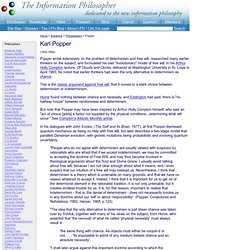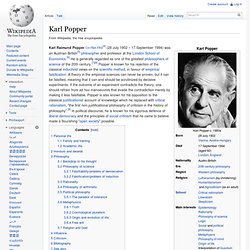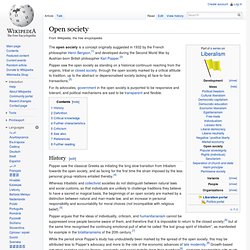

Karl Popper. "People who do not agree with determinism are usually viewed with suspicion by rationalists who are afraid that if we accept indeterminism, we may be committed to accepting the doctrine of Free Will, and may thus become involved in theological arguments about the Soul and Divine Grace.

I usually avoid talking about free will, because I am not clear enough about what it means, and I even suspect that our intuition of a free will may mislead us. Nevertheless, I think that determinism is a theory which is untenable on many grounds, and that we have no reason whatever to accept it. Karl Popper. Karl Raimund Popper CH FBA FRS[4] (28 July 1902 – 17 September 1994) was an Austrian-British[5] philosopher and professor at the London School of Economics.[6] He is generally regarded as one of the greatest philosophers of science of the 20th century.[7][8] Popper is known for his rejection of the classical inductivist views on the scientific method, in favour of empirical falsification: A theory in the empirical sciences can never be proven, but it can be falsified, meaning that it can and should be scrutinized by decisive experiments.

If the outcome of an experiment contradicts the theory, one should refrain from ad hoc manoeuvres that evade the contradiction merely by making it less falsifiable. Personal life[edit] Family and training[edit] Karl Popper was born in Vienna (then in Austria-Hungary) in 1902, to upper middle-class parents. He worked in street construction for a short amount of time, but was unable to cope with the heavy labour. Open society. The open society is a concept originally suggested in 1932 by the French philosopher Henri Bergson,[1] and developed during the Second World War by Austrian-born British philosopher Karl Popper.[2] Popper saw the open society as standing on a historical continuum reaching from the organic, tribal or closed society, through the open society marked by a critical attitude to tradition, up to the abstract or depersonalised society lacking all face-to-face transactions.[3] History[edit] Popper saw the classical Greeks as initiating the long slow transition from tribalism towards the open society, and as facing for the first time the strain imposed by the less personal group relations entailed thereby.[4] Definition[edit]
